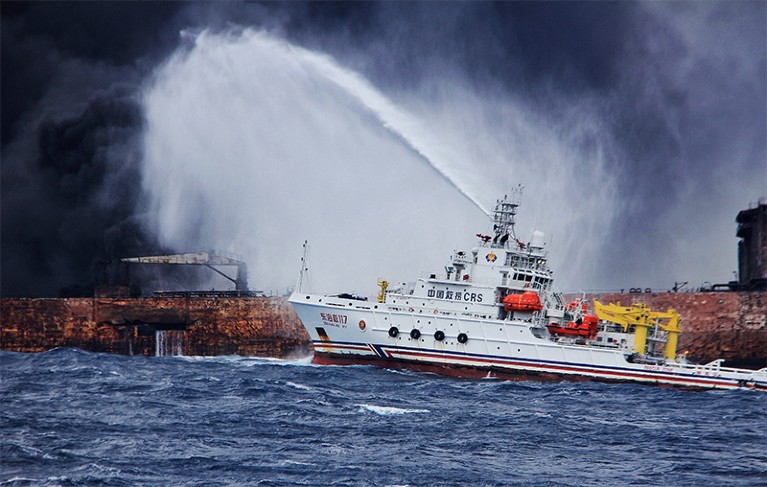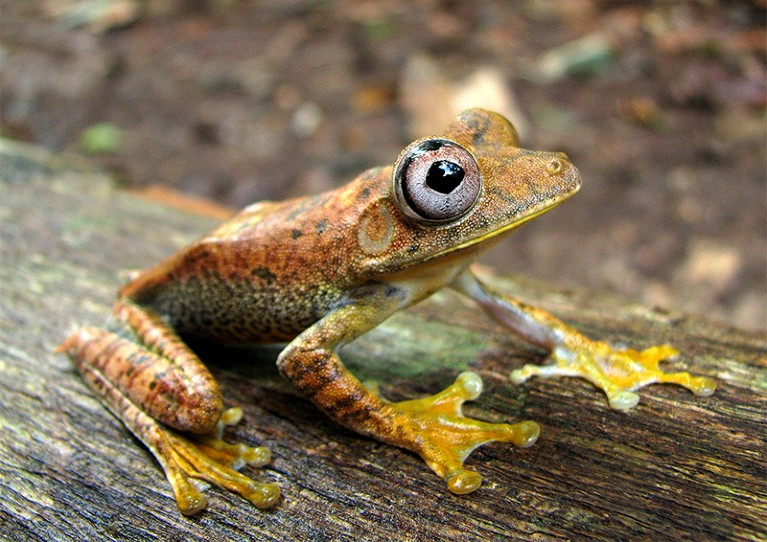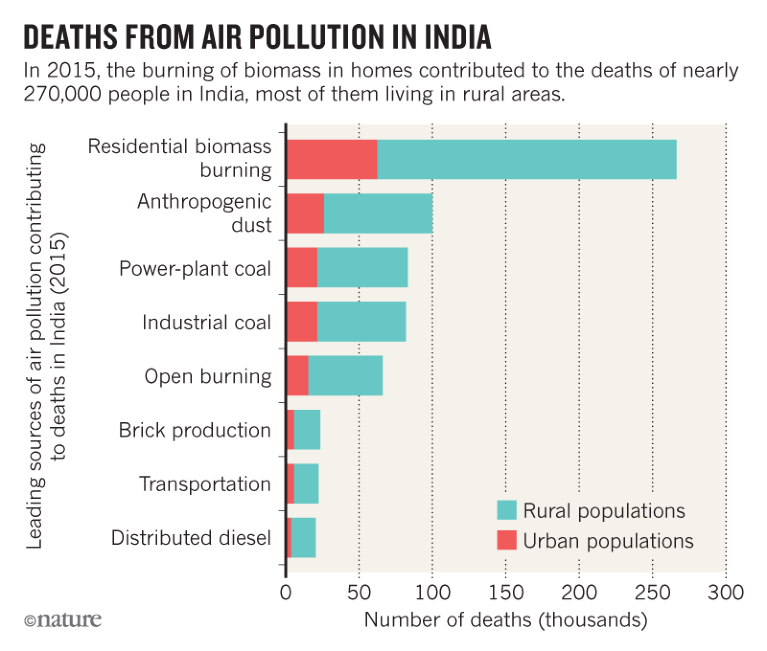EVENTS
Tanker crash raises oil-spill fears An Iranian oil tanker sank in the East China Sea on 14 January, eight days after colliding with a cargo ship. The Sanchi was carrying 136,000 tonnes of ultra-light crude oil, and had been adrift and partly on fire after the accident, prompting fears of a significant oil spill. Chinese state media reported that the fire spread further and the tanker sank. The vessel’s 32 crew perished in the accident. It is so far unclear how much oil has been released. China’s State Oceanic Administration says that it will monitor the site for environmental damage.

Rescue boats try to extinguish flames on the stricken Iranian oil tanker Sanchi.Credit: Xinhua via ZUMA
Meeting probe University College London (UCL) has launched an internal inquiry after it emerged that a series of controversial conferences on intelligence took place there. The meeting, called the London Conference on Intelligence, has been held annually since at least 2015 and was organized by psychologist and UCL honorary lecturer James Thompson, the university said. Talk topics have included purported disparities in cognitive ability linked to genetics, race and gender, and the cover of the 2016 conference brochure features an early-twentieth-century quote by a US eugenics proponent. UCL said in a statement that it had not approved the events and its officials had not been informed about the meetings’ speakers, as they should have been. It is investigating a possible breach of its room-booking process, and said that it is “committed to free speech but also to combatting racism and sexism in all forms”. Thompson did not respond to requests for comment. The details of the meetings were reported last week by the London Student newspaper and the UK magazine Private Eye.
FACILITIES
Maths institute Imperial College London and the French CNRS — Europe’s largest basic-science agency — inaugurated a joint mathematics laboratory at the British university’s campus on 15 January. The centre, named after French mathematician Abraham de Moivre, is the first CNRS research unit to be established in the United Kingdom, and will give Imperial College mathematicians continued access to French funding after the United Kingdom leaves the European Union in 2019. It builds on a fellowship programme that supports extended stays by French mathematicians at Imperial, and will also sponsor Imperial mathematicians to spend time at French institutions.
PEOPLE
Society head Former US Department of Energy secretary Steven Chu is the president-elect of the American Association for the Advancement of Science (AAAS), the organization announced on 9 January. He succeeds former US Food and Drug Administration commissioner Margaret Hamburg, who will begin her term as the group’s president in February. AAAS leaders spend a year as president-elect, a year as president and a year as chair of the board of directors. Chu is currently a physicist at Stanford University in California and is known for his work developing ways to cool and trap atoms using lasers, which won the 1997 Nobel Prize in Physics.
Indian space chief Renowned space scientist K. Sivan has been appointed chief of the Indian Space Research Organisation (ISRO). Sivan, who is currently the director of ISRO’s Vikram Sarabhai Space Centre in Thiruvananthapuram, replaces A. S. Kiran Kumar, whose three-year tenure ended on 14 January. Sivan joined ISRO in 1982 and has contributed to the design and mission planning of two of the agency’s key launch systems: the Geosynchronous Satellite Launch Vehicle and the Polar Satellite Launch Vehicle. On 12 January, the agency launched its 100th satellite, along with 30 others.
CONSERVATION
Rainforest park Peru has designated a new reserve in the heart of the Amazon rainforest. The Yaguas National Park, announced on 11 January, covers nearly 869,000 hectares along the Putumayo River in northeastern Peru. The area houses two-thirds of the country’s freshwater fish species as well as thousands of plants, birds and other animals, according to scientists at the Field Museum in Chicago, Illinois, who led a team that surveyed the area in partnership with local communities and the Peruvian government. As well as protecting the forest and wildlife, scientists say, the park will benefit indigenous residents by helping to prevent illegal logging and gold mining that harm their health and livelihoods.

A Hypsiboas frog in Yaguas National Park.Credit: Jonh Jairo Mueses-Cisneros
POLICY
Fossil-fuel funds New York City’s pension funds will shed investments worth some US$5 billion distributed between more than 190 fossil-fuel companies over the next 5 years. Mayor Bill de Blasio and other officials announced the decision on 10 January. De Blasio also announced that the city has filed a lawsuit against five of the largest publicly traded fossil-fuel companies: BP, Chevron, ConocoPhillips, Exxon Mobil and Royal Dutch Shell. The suit seeks billions of dollars in damages for harm that the city has already sustained as a result of global warming, as well as future spending to address the effects of climate change.
FUNDING
Italian excellence The Italian ministry of research announced on 9 January how it will distribute a €1.3-billion (US$1.6-billion) pot of funds as part of an initiative aimed at boosting research excellence. The money will be given out over 5 years to 180 university departments judged in a competition to have the strongest research plans. It is the first time Italy has run a competitive research-excellence scheme. Just 25 winners were from universities in the poorer south of the country. The ministry pledged to use €110 million of European Union subsidies to bolster prospects in future excellence competitions for researchers in disadvantaged areas.
POLITICS
Immigration lawsuit The US government must continue a programme that gives temporary residency to people who entered the United States illegally as children, a federal district court judge in San Francisco, California, said on 9 January. US President Donald Trump had sought to end the programme, called Deferred Action for Childhood Arrivals (DACA), with his administration announcing last September that it would not renew work permits awarded through DACA after 5 March, leaving 800,000 young immigrants, including some scientists, in limbo. In response, several states sued the federal government; the lawsuit that prompted the new injunction was filed by the state of California and the University of California system. The nationwide injunction will stay in place while the case wends its way through the legal system.
Map mayhem Mathematical analyses featured heavily in a 9 January US federal-court decision that found a North Carolina congressional-district map unconstitutional. The map defines voting districts that will each elect one member to send to the House of Representatives this year. A panel of three judges ruled unanimously that it had been drawn to give an advantage to the Republican Party. Among other lines of evidence, the judges cited work by mathematician Jonathan Mattingly of Duke University in Durham, North Carolina, in their conclusion that lawmakers had crafted the map “to subordinate the interests of non-Republican voters”. The state has until 29 January to submit a redrawn map to the court. See Editorial for more.
RESEARCH
Dark-energy data The Dark Energy Survey — an effort to probe the properties of the mysterious force that is accelerating the expansion of the Universe — made its first three years of data freely available on 10 January. It is the first major release by the project, which launched in 2013. The data contain information on about 400 million astronomical objects. Cosmologists have already used some of the information to create the biggest map yet of the Universe, charting the distribution of matter in part by measuring how mass bends light. The survey is a collaboration of more than 400 researchers, and mainly gathers data using a telescope in Chile.
TECHNOLOGY
AI beats humans Artificial-intelligence programs built by Chinese e-commerce giant Alibaba and Microsoft have scored higher than humans in a challenging reading-comprehension test. On 15 January, Alibaba announced that the company’s deep-neural-network model had scored 82.44 on the Stanford Question Answering Dataset, a machine reading-comprehension test in which machines must provide exact answers to questions based on 500 Wikipedia articles. Microsoft’s model scored 82.65, also beating human performance (82.304). Alibaba’s chief scientist of natural-language processing, Luo Si, said that the company’s AI technology could be used for customer service, museum tutorials and medical enquiries.
TREND WATCH
Air pollution was responsible for about 1.1 million deaths in India in 2015, according to a report by an Indian collaboration released on 11 January. Burning fuel at home contributed to the deaths of 268,000 people — roughly 25% of all deaths caused by inhalation of fine airborne particles. India has some of the world’s worst air pollution, with almost all of its population living in areas where pollution exceeds World Health Organization guidelines.

Source: Health Effects Institute



